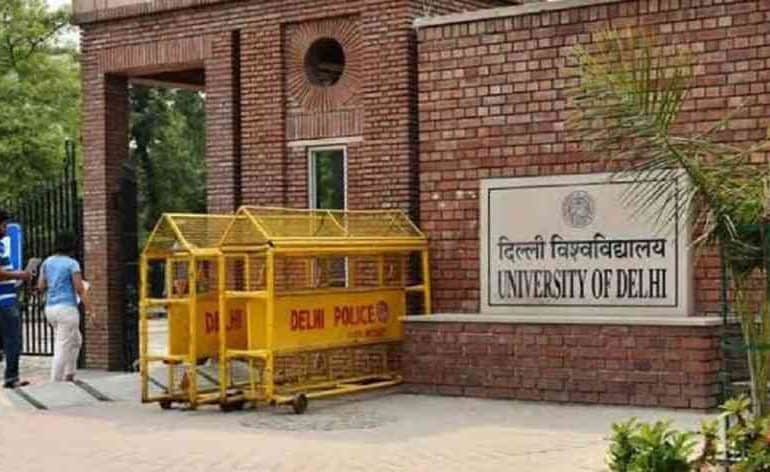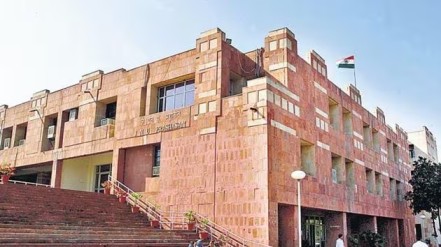As the populist Bharatiya Janata Party vouches for a massive 370+ seat victory showdown in the Lok Sabha Elections of 2024, the question arises: what does the future hold for India’s opposition and, essentially, its democracy?
As the largest democracy in the world gears up to vote for its 18th Lok Sabha starting on April 19, 2024, elections in India today are the sole sustainers of the bare bones of its democracy. From the consecration of the Ram Temple to the electoral bonds to the arrest of Delhi Chief Minister, Arvind Kejriwal, pre-elections within India have always been accentuated with a sprinkle of political hustle-bustle. However, with the massive saffron juggernaut crippling the opposition with each passing day, the concern shifts from whether the BJP will be able to secure a 400+ victory to how many more years will the opposition in India survive, considering the current state of political affairs?
Political analysts within India and beyond have poured in opinions regarding the rusty machinery of the Indian opposition—the INDIA alliance and Rahul Gandhi at the helm of it. The 27-member bloc of the Indian National Developmental Inclusive Alliance, popularly called the INDIA Alliance, was formed to take on the so-called invincible Modi Empire but has been bereft of success throughout. Unlike the saffron empire of Narendra Modi, the INDIA Alliance lacks a face, agenda, or narrative. On a comparative scale, the Bharatiya Janata Party provides ordinary Indians with a populist mix of Hindu nationalism and economic empowerment. Narendra Modi’s brand of Viksit Bharat and Ek Bharat Shresth Bharat makes people proud again of being Indian, even if it’s a page out of the populist playbook. This brand attributed to Modi plays upon an ordinary person’s sense of vulnerability and lack of self-esteem and grants an identity punctuated with pride and confidence in being an Indian and a Hindu, according to the BJP book. Hence, the BJP gradually appropriated the Bharat tag, to be recognised as a great power in spite of all their shortcomings.
Political experts often mention the failure of the Congress to rebuild its organisation and political machinery to take on the BJP during its decade in opposition. While the INDIA Alliance initially constituted 28 blocs, including several local opposition heavyweights like Mamata Banerjee’s Trinamool Congress and the Samajwadi Party, the Congress Party and its face, Rahul Gandhi have been at the helm of this alliance. In the recent run-up to the general elections, the INDIA Alliance has faced several defections, ideological differences, and a lack of a cohesive campaigning or a catchy narrative to fire up the voters’ imagination. Despite Rahul Gandhi’s 4200-mile-long Bharat Jodo Yatra, the Indian opposition finds itself on an uneven playing field in this election; all the odds keep stacking against it, but how and why?
Rahul Gandhi, the star power of the Congress, despite being a recognized name within the opposition, is said to lack leadership skills, according to election strategists and political analysts. Political tactician Prashant Kishor, in his recent interview, also pointed out several opportunities where the opposition “dropped catches” in the run-up to the general elections. Prashant Kishor mentioned that the decline of the Congress Party began post-1984, when it registered its biggest win, but has been unable to win elections on its own since then. He mentions Rahul Gandhi’s tactical error when it comes to the Bharat Jodo Yatra and pinpoints that the campaign should have been undertaken under the INDIA Alliance rather than as a leader of the Congress Party; otherwise, it becomes a way to divert attention from such a critical election.
Unfortunately, Kishor’s predictions have rung true, and the INDIA Alliance has faced massive defection blows, with Nitish Kumar switching to saffron colours right before the general elections and West Bengal Chief Minister Mamata Banerjee disagreeing upon a seat-sharing negotiation between the Indian National Congress and the Trinamool Congress and consequently backing off from the Opposition Alliance. Seat-sharing negotiations have underlined major break-ups within the INDIA Alliance, with the Congress pitching a majority of its candidates for the seats within constituencies of importance. Kishor articulates Rahul Gandhi’s strategic error concerning election campaigning by saying that:
“It is as if you are leading a multi-country army, but at the time of war, the Commander-in-Chief of the multi-country army has left the headquarters and is somewhere outside.”
Prashant Kishor also mentions Rahul Gandhi’s fear of contesting from the Hindi heartland of Amethi in Uttar Pradesh after his defeat against Smriti Irani in the preceding general elections but from the South-Indian constituency of Wayanad.
“You cannot win India unless you win the Hindi Heartland.”
Kishor’s words are emphasized by the evidential facts that he pours in concerning the misplaced strategies of the opposition. According to Prashant Kishor, “Your (the opposition’s) fight is in Uttar Pradesh, Bihar, and Madhya Pradesh, but you are touring Meghalaya and Manipur.” He even adds that the alliance is not effective in defeating the ruling party, as there is a one-on-one contest in 350 seats where the competition just boils down to the Congress vs. the BJP.
Ever since 2014, the opposition has given away several opportunities to take on the ruling party head-on. Prashant Kishor mentions three invaluable moments when the BJP was in a downslide but the opposition’s “laziness” prevented it from mounting any challenge. Kishor mentions the BJP’s barren phase during 2015-16, when it lost several assembly polls across the country except in Assam. Moreover, the BJP also faced a poor run post-demonetization when it almost lost power in Gujarat and was defeated in several states in 2018. Most importantly, the COVID-19 pandemic of 2020 and the subsequent years also saw the BJP facing losses in West Bengal due to its inability to invest in health infrastructure. However, the Indian Opposition was not quick to capitalize upon the weaknesses of the ruling government and pose a challenge to what has now snowballed into the all-powerful saffron regime.
Despite such shortcomings from the BJP, it has rebuilt its picture quite well to ensure its ‘Abki Baar 400 Paar’ in the 2024 general elections. Modi’s assurance of establishing India as a global superpower with the country’s leadership in the G20 Summit of 2023 and the infamous moon landing has reconstructed his image as a strong, popular leader who is perceived to use the machinery to stay in power pretty well. While alternative media and international institutions speculate upon the Modi Regime’s crackdown upon democracy, the saffron juggernaut has been impeccable in executing its Scorched Earth Policy against the crippled opposition—just wipe out whatever comes in your way so that the power mammoth can move without any obstruction or challenges.
While the opposing Congress has sewed out several failures of the ruling government in its election campaigns, its struggles are insignificantly synonymous with a lilliput taking upon the might of Gulliver, which is the Saffron Alliance. The basic dimensions of a democratic state—the legislature, the judiciary, the media, and the ‘autonomous watchdogs’ like the Election Commission, the Reserve Bank, the Enforcement Directorate, and the Central Bureau of Investigation—all come under the perception of being hijacked by the rulers. Narendra Modi’s government has been labelled as an ‘electoral autocracy, weaponizing state agencies to stifle, attack, and arrest opposition politicians and undermining democratic principles.’
As the usual game of politics unravels, the opposition can now only capitalize upon its accusations against the BJP, but the tragedy remains that they are at the end of their rope. While the strategic errors of the opposition remain to be blamed for the BJP holding fort for the third term, the supposedly autonomous Indian media might also be another factor for why the Indian opposition lies weak and (almost) dead. Mainstream media within the country today has become an echo chamber celebrating the Modi government. While narratives are sown, painting Narendra Modi as a deity forging the rebirth of Rama Janmabhoomi and Rahul Gandhi getting mugged during the Bharat Jodo Yatra is all the coverage the opposition is provided within mainstream channels. Synonymously, Arvind Kejriwal’s arrest in late March of 2024 was also portrayed as a ‘party in power serious about fighting corruption’ with no speculation or debate regarding the timing of the arrest. News anchors rejoice upon the G20 Summit, the Ram Temple, and the Chandrayaan and attribute them to Modi’s Viksit Bharat, while at the same time failing to cover the ruling government’s inability to increase education opportunities, improve medical infrastructure post-pandemic, or invest in youth employment, which still dips below 50 percent among 20 to 24-year-olds. While the fourth pillar of democracy gradually falls into shambles, the other dimensions follow the same tragic downfall.
The opposition’s cries of ‘tax terrorism’ with the Congress’ bank accounts being frozen by the Income Tax Department due to a dispute from 2018 and thereby crippling its ability to campaign pre-elections today fall upon deaf ears. Atishi Marlena, Education Minister of Delhi’s accusation against the BJP of forcing opposition leaders to switch parties under the threat of ED arrest, all weave into the narrative of the ‘Washing Machine Effect’ today—that opposition leaders are more interested in power than political ideology in serving their electorate. Moreover, autonomous institutions have also been clenched by this ruling superpower today, with police quelling peaceful protests and detaining activists and dissidents. An investigation led by the Indian Express emphasizes that 95% of the ‘autonomous’ agencies’ investigations have focused on the opposition, contrasting with the numbers under the previous government, which were 54% of the Enforcement Directorate and 60% of the Central Bureau of Investigation probing the opposition. In a similar investigation, The Wire also claims that nearly 12 opposition leaders joined the BJP while facing criminal charges in the past months, with Nitish Kumar switching sides before the ED planned to arrest him on charges of money laundering. Even as Amnesty International describes this ‘crackdown on the opposition’ as ‘a crisis point’, there is no exit from this supposed emergency upon democracy.
The lack of a staunch narrative or agenda leaves the Indian opposition barren today. The Congress has been hollowed out with infighting and accusations of corruption within the party. There was a time after independence, and for many years after independence, it was said that you would find a Congress flag in every single village in India. That is, however, no longer true. Even as Congress Party President Mallikarjun Kharge implores voters to ‘Save the Democracy’ at the historic Ramilla Maidan, where once the same opposition had toppled the Indira Gandhi Regime 40 years ago, the unfortunate truth lies that the time has ticked out and the race has already been lost.
Nevertheless, dear reader, if you have successfully reached the end of this overly-long piece, I am sure the question will arise in your mind: if not Modi, then who? And you have all the rights to ask this. But the sad fact answer to your question is that there is no other ‘who’ besides Modi today, after all. Today, the question is not about how big or thrashing the BJP’s margin will be in the Lok Sabha elections, but if 400 seats out of the 543 within the Parliament are within the stronghold of a singular ideology, will democracy really survive?
The world once viewed us as the ‘largest democracy in the world’. Today, however, the country is crippled by a paralyzed democracy and an obliterated opposition, deluded amidst its saffron pride and ‘Sabka Saath, Sabka Vikaas’ with no heed to poverty, inflation, unemployment, and yet a subconscious fear towards the survival of the Constitution and democracy. But what does the future hold? The answers are murky, and it’s all a scary test of time now.
Read Also: Lok Sabha Elections 2014: A dance of democracy, glamour and technology
Featured Image Credits: IndiaToday
Priyanka Mukherjee
[email protected]










